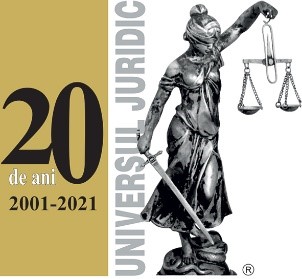Drept civil vs. Contabilitate. Sau despre cum (nu) operează compensaţia legală în cazul persoanelor juridice
bogdandumitrache7[at]gmail.com
Cuvinte cheie:
art. 1.617 of the Civil Code, statutory offsetting, Government Decision no. 685/1999, Offsetting service, supporting document, accounting recordRezumat
The civil code enshrines, among other ways of extinguishing the obligation, the statutory offsetting, defined by the idea that it clears mutual, certain, liquid and payable claims up to the amount of the smallest claim.
In relation to the lack of distinction of the provisions in the matter of statutory offsetting, the benefit of avoidance of a double payment should rest, in equal measure, with the legal entities in their relationships.
However, there are special regulations – one generated by the payment blockage in the economy, which characterized the end of the last millennium (G.E.O. no. 77/1999, enforced by the Offsetting Regulation approved by the Government Decision no. 685/1999), and the other regulation is represented by the Accounting Regulations on the annual individual financial statements and the annual consolidated financial statements (the version into force being the version approved by the Order no. 1802/2014, as subsequently amended) – which oppose to the statutory offsetting, not being allowed to operate, as in the common law (Civil Code), namely, by operation of law.
Conditioning the offsetting on the draft of an offsetting order, based on the consent expressed by both legal entities involved and, except the invoices the amount of which is less than lei 10,000 (little more than EUR 2,000), following a relatively bureaucratic procedure, managed by a structure subordinated by the Ministry of Industry and Commerce (at present, of the Economy), is particularly stricter since this offsetting order is qualified by the Offsetting Regulation as being a supporting registration document of the accounting offsetting, and therefore, its replacement has been forbidden especially by art. 3 of the Government Decision no. 685/1999, approving this regulation.
The obvious need, given that it is of a practical nature, for finding a solution for the assumption in which parties disagree with the offsetting result – as they do not recognize the existence of certain mutual claims or because of the fact that they do not agree upon the balance which would result from the respective offsetting – is one of the explanations for filing certain actions such as the declaratory action of the statutory offsetting, filed by the party which, for various reasons, pushes forward to obtain a judicial clarification of the situation and, implicitly, an alternative supporting document for the accounting record of the offsetting, namely the court order for admission of the above mentioned action.
The judicial solution to which, furthermore, the natural persons refer to for other reasons than those related to accounting, has as a main disadvantage not the interdiction of the replacement of the offsetting order – it must be admitted, despite of any restrictive rule, that a court order has a power equal to a convention (the offsetting order) which the parties to the dispute settled under a judgment, would have concluded if they had been able to agree upon the offsetting terms –, by the costs inconvenience, where the payment of the stamp duty and the pending resolution of an action by a final judgment are set out.
The alternative to the judicial solution is rather theoretical, given that it refers to interdisciplinary approach in the enforcement of law: the tax bodies examining the accounting records should be ready to accept any explanatory notes to accounting statements for the purpose of a unilateral finding of the offsetting by the taxpayer, verifying it by reference to the primary record of the claim and of the debt held by that taxpayer against its counterparty. However, if it was too much for the tax control body to accept such an explanatory note, therefore, not being accompanied by the sacrosanct offsetting order, it would be appropriate for the administrative and fiscal contentious court vested by the taxpayer with challenging the findings made by the control body in prejudicing its rights, to be more responsive, as a result of ignoring the statutory offsetting for lack of the offsetting order.
Publicat
Versiuni
- 24-04-2023 (2)
- 13-09-2022 (1)









